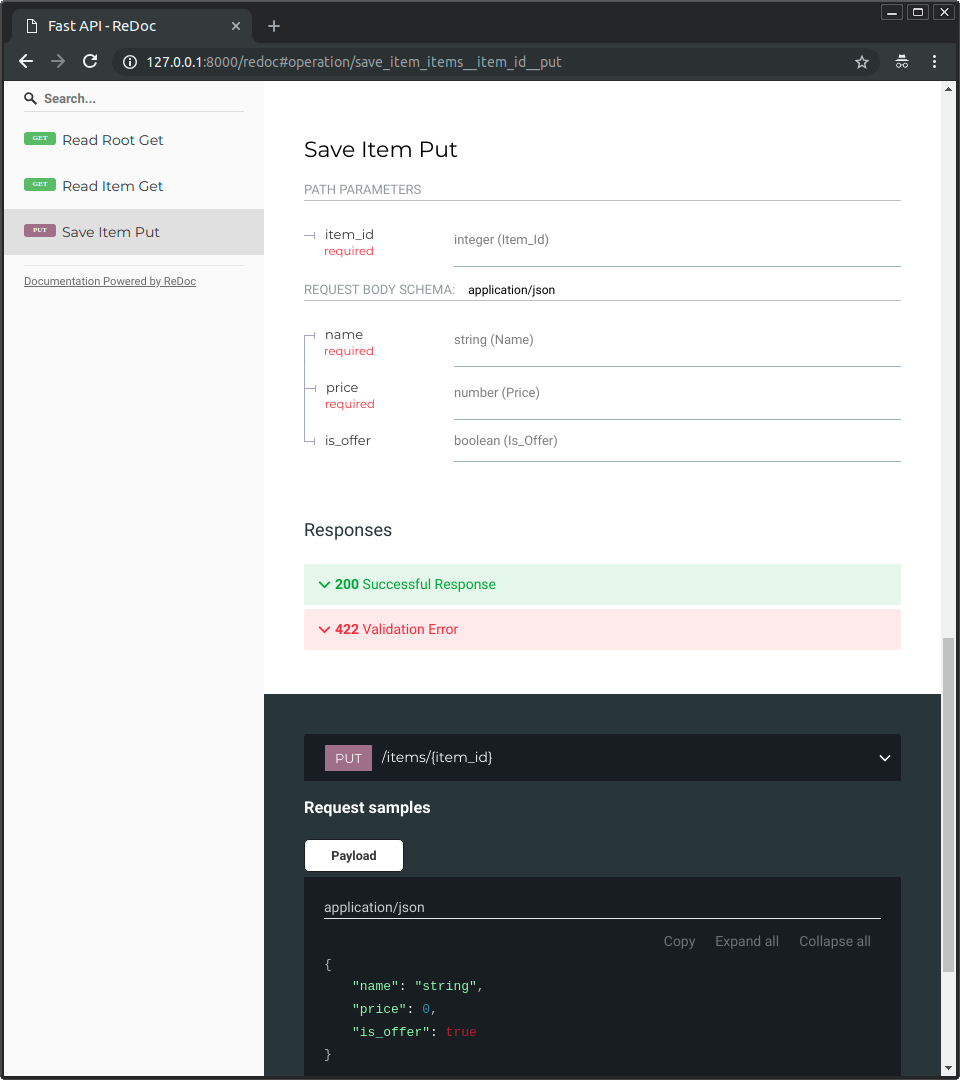- Sort Score
- Result 10 results
- Languages All
Results 221 - 230 of 681 for Python3 (0.17 sec)
-
docs/uk/docs/tutorial/path-params.md
```JSON {"item_id":3} ``` /// check | Примітка Зверніть увагу, що значення, яке отримала (і повернула) ваша функція, — це `3`. Це Python `int`, а не рядок `"3"`. Отже, з таким оголошенням типу **FastAPI** автоматично виконує <abbr title="перетворення рядка, що надходить із HTTP-запиту, у типи даних Python">"парсинг"</abbr> запитів. /// ## <abbr title="Або валідація">Перевірка</abbr> данихRegistered: Sun Sep 07 07:19:17 UTC 2025 - Last Modified: Sun Aug 31 10:29:01 UTC 2025 - 14.1K bytes - Viewed (0) -
docs/pt/docs/index.md
Você faz isso com os tipos padrão do Python moderno. Você não terá que aprender uma nova sintaxe, métodos ou classes de uma biblioteca específica etc. Apenas **Python** padrão. Por exemplo, para um `int`: ```Python item_id: int ``` ou para um modelo mais complexo, `Item`: ```Python item: Item ``` ...e com essa única declaração você tem:
Registered: Sun Sep 07 07:19:17 UTC 2025 - Last Modified: Sun Aug 31 10:49:48 UTC 2025 - 21.6K bytes - Viewed (0) -
docs/fr/docs/async.md
## `async` et `await` Les versions modernes de Python ont une manière très intuitive de définir le code asynchrone, tout en gardant une apparence de code "séquentiel" classique en laissant Python faire l'attente pour vous au bon moment. Pour une opération qui nécessite de l'attente avant de donner un résultat et qui supporte ces nouvelles fonctionnalités Python, vous pouvez l'utiliser comme tel : ```Python burgers = await get_burgers(2) ```
Registered: Sun Sep 07 07:19:17 UTC 2025 - Last Modified: Sun Aug 31 09:56:21 UTC 2025 - 25.4K bytes - Viewed (0) -
tensorflow/api_template.__init__.py
from tensorflow.python import pywrap_tensorflow as _pywrap_tensorflow # pylint: disable=unused-import from tensorflow.python.tools import module_util as _module_util from tensorflow.python.util.lazy_loader import KerasLazyLoader as _KerasLazyLoader # Make sure code inside the TensorFlow codebase can use tf2.enabled() at import. _os.environ["TF2_BEHAVIOR"] = "1" from tensorflow.python import tf2 as _tf2 _tf2.enable()
Registered: Tue Sep 09 12:39:10 UTC 2025 - Last Modified: Wed Oct 02 22:16:02 UTC 2024 - 6.8K bytes - Viewed (0) -
docs/ja/docs/features.md
 ### 現代的なPython FastAPIの機能はすべて、標準のPython 3.8型宣言に基づいています(Pydanticの功績)。新しい構文はありません。ただの現代的な標準のPythonです。 (FastAPIを使用しない場合でも)Pythonの型の使用方法について簡単な復習が必要な場合は、短いチュートリアル([Python Types](python-types.md){.internal-link target=_blank})を参照してください。 型を使用した標準的なPythonを記述します: ```Python from datetime import date from pydantic import BaseModelRegistered: Sun Sep 07 07:19:17 UTC 2025 - Last Modified: Sat Nov 09 16:39:20 UTC 2024 - 12.2K bytes - Viewed (0) -
docs/en/docs/tutorial/header-params.md
But a variable like `user-agent` is invalid in Python. So, by default, `Header` will convert the parameter names characters from underscore (`_`) to hyphen (`-`) to extract and document the headers. Also, HTTP headers are case-insensitive, so, you can declare them with standard Python style (also known as "snake_case").
Registered: Sun Sep 07 07:19:17 UTC 2025 - Last Modified: Sun Aug 31 09:15:41 UTC 2025 - 3K bytes - Viewed (0) -
docs/fr/docs/index.md
Vous faites cela avec les types Python standard modernes. Vous n'avez pas à apprendre une nouvelle syntaxe, les méthodes ou les classes d'une bibliothèque spécifique, etc. Juste du **Python** standard. Par exemple, pour un `int`: ```Python item_id: int ``` ou pour un modèle `Item` plus complexe : ```Python item: Item ```
Registered: Sun Sep 07 07:19:17 UTC 2025 - Last Modified: Sun Aug 31 10:49:48 UTC 2025 - 22K bytes - Viewed (0) -
docs/es/docs/async.md
## `async` y `await` Las versiones modernas de Python tienen una forma muy intuitiva de definir código asíncrono. Esto hace que se vea igual que el código "secuencial" normal y hace el "wait" por ti en los momentos adecuados. Cuando hay una operación que requerirá esperar antes de dar los resultados y tiene soporte para estas nuevas funcionalidades de Python, puedes programarlo así: ```Python burgers = await get_burgers(2) ```
Registered: Sun Sep 07 07:19:17 UTC 2025 - Last Modified: Sun Aug 31 09:56:21 UTC 2025 - 24.7K bytes - Viewed (0) -
docs/ja/docs/tutorial/path-params.md
# パスパラメータ Pythonのformat文字列と同様のシンタックスで「パスパラメータ」や「パス変数」を宣言できます: {* ../../docs_src/path_params/tutorial001.py hl[6,7] *} パスパラメータ `item_id` の値は、引数 `item_id` として関数に渡されます。 しがたって、この例を実行して <a href="http://127.0.0.1:8000/items/foo" class="external-link" target="_blank">http://127.0.0.1:8000/items/foo</a> にアクセスすると、次のレスポンスが表示されます。 ```JSON {"item_id":"foo"} ``` ## パスパラメータと型 標準のPythonの型アノテーションを使用して、関数内のパスパラメータの型を宣言できます:Registered: Sun Sep 07 07:19:17 UTC 2025 - Last Modified: Mon Nov 18 02:25:44 UTC 2024 - 10.4K bytes - Viewed (0) -
docs/fr/docs/alternatives.md
> Requests est l'un des packages Python les plus téléchargés de tous les temps La façon dont vous l'utilisez est très simple. Par exemple, pour faire une requête `GET`, vous devez écrire : ```Python response = requests.get("http://example.com/some/url") ``` En contrepartie l'API _des opérations de chemin_ de FastAPI pourrait ressembler à ceci : ```Python hl_lines="1" @app.get("/some/url") def read_url():
Registered: Sun Sep 07 07:19:17 UTC 2025 - Last Modified: Sat Nov 09 16:39:20 UTC 2024 - 27.5K bytes - Viewed (0)